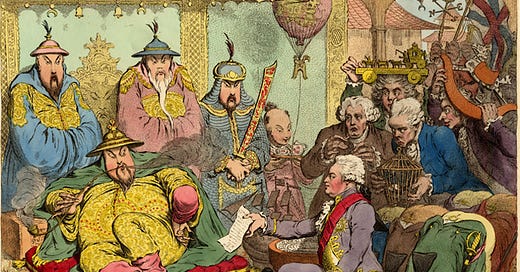Kowtow vs. Fist Bump: How A Greeting Can Overshadow The Substance Of A Diplomatic Mission
President Biden and Saudi Crown Prince Mohammed bin Salman's awkward meeting isn't the first time two leaders have struggled over the method of their introductions.
Most Americans are familiar with the aphorism, attributable to Winston Churchill (or before him, George Santayana), that “those who fail to learn from history are condemned to repeat it.” In the case of Joe Biden’s July trip to Saudi Arabia wherein he greeted the de facto ruler of that nation, Prince Mohammed bin Salman, with a fist bump rather than a handshake, repeating history might have been the best case scenario, or at least one better than the fiasco that resulted.
The issue of how to greet a foreign leader is not unprecedented. It arose, most famously, during the diplomatic mission of Lord Macartney to China on behalf of George III and Great Britain, memorialized in a remarkable book, The Immobile Empire, by Alain Peyrefitte.
In 1792, Lord Macartney, perhaps best known as the author of the phrase that “the sun never sets” on Britain’s empire, was selected to head that country’s first diplomatic mission to the court of the Manchu dynasty in China. The mission involved the negotiation of many substantive issues, including the potential cession to Great Britain of an island from which it could conduct trading, comparable to the Portuguese base in Macao, the reduction of tariffs, and the establishment of a British embassy in Peking. It also presented an opportunity for Britain to entice further trade from China by the display of British goods.
Once the diplomats arrived in China, however, one procedural issue grew in significance to overshadow the substantive ones: how was the English envoy to present himself at court when introduced to the Emperor. The Chinese, considering their nation to be the Middle Kingdom and all other kingdoms tributary vassals, demanded that the English envoy behave in the same manner as envoys from every other vassal state – by kowtowing, or prostrating himself, nine times when presented to the Emperor. They treated the goods displayed by the British as tribute. The British envoys, representing what they perceived to be the most powerful nation in the world, refused. As the British progressed from the port city of Tientsin to Peking, the negotiations over the kowtow grew feverish. For example, the Chinese proposed that they hang a portrait of George III behind the Emperor, so that Macartney could claim to be kowtowing to his own king. But Macartney remained resolute; he refused to kowtow.
As the negotiations reached their climax, Macartney proposed a solution that was, for the most part, grudgingly accepted by the Chinese: Macartney informed them that he would treat the Emperor as he treated his own sovereign, by genuflecting on one knee and kissing the Emperor’s hand. The Chinese acceded to Macartney’s genuflecting, but declined to allow him to touch the Emperor.
Ironically, although the Chinese had flinched in the negotiations, it was Macartney who was subsequently castigated for his gesture. When he returned to England, he was mocked by his political opponents. By contrast, the Chinese portrayed the incident so skillfully that Chinese subjects believed that Macartney had given way, not the Emperor. For example, one Chinese account suggested that Macartney had been so overwhelmed by the magnificence of the Emperor that he had fallen to his knee and forgotten to kowtow. Eventually, it became accepted domestically that it was the British who had folded on the issue and that Macartney had, in fact, kowtowed.
There are many similarities between Joe Biden’s refusal to shake the hand of Mohammed bin Salam and Lord Macartney’s refusal to kowtow. Like Lord Macartney, Joe Biden represented the most powerful country in the world. Nevertheless, like Lord Macartney, Joe Biden came away from his meeting empty-handed. Perhaps most significantly, like Lord Macartney, Joe Biden lost the messaging battle after the greeting, and was universally ridiculed for his fist bump. Having created the situation precisely to send a message to the world, Joe Biden should have ensured that the message he sent was the winning one.
Nevertheless, there are significant differences between the two incidents. Whereas the dilemma faced by Lord Macartney was the unavoidable consequence of two irreconcilable cultures colliding, Joe Biden’s dilemma was self-imposed. More importantly, Biden’s solution, unlike Lord Macartney’s, demonstrated his weakness rather than his strength. Whereas Lord Macartney devised his compromise to allow the Chinese to save face, Biden’s solution – the fist bump – was intended to allow him to save face. One is hard-pressed to say that it succeeded.
Perhaps Joe Biden would have been best served by repeating history and following the example of Lord Macartney. He could have simply announced that he would treat all foreign dignitaries with equal courtesy and, on that basis, shaken the Prince’s hand. It might not have forestalled criticism, but it would at least have had the benefit of being premised upon a defensible principle, not upon a blatantly contrived pretext. At a minimum, Joe Biden would not have performed a gesture that satisfied no one.





Another example. When WIll Rogers was introduced to President Calvin Coolidge, he said, "Didn't quite catch the name."